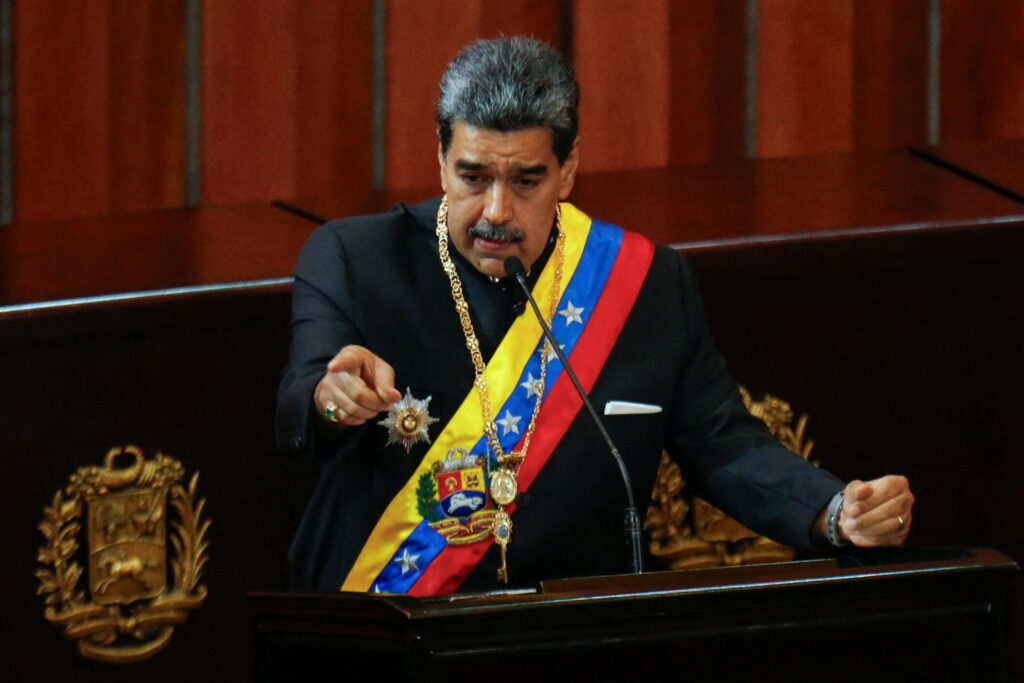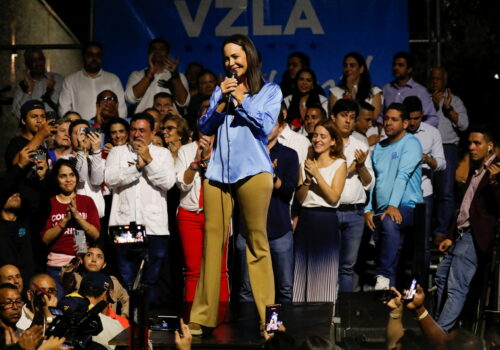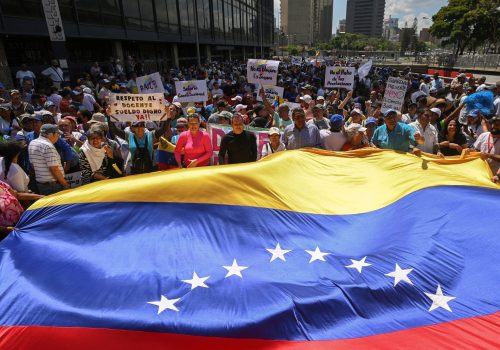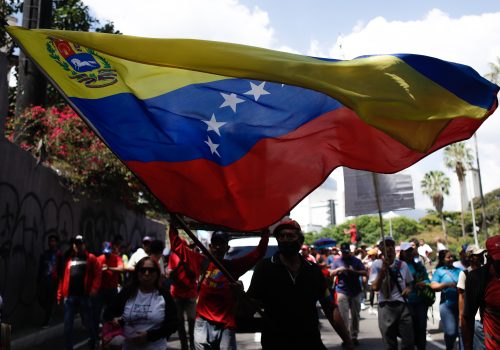From Barbados to the ballot box, things got bumpy. On Wednesday, the United States announced plans to reimpose oil sanctions on Venezuela—though with opportunities for exemptions—faulting Nicolás Maduro’s government for failing to uphold an agreement signed in Barbados in October 2023. The agreement was intended to put Venezuela on the path to holding a competitive presidential election in 2024, but Maduro’s government has cracked down on its political opponents ahead of the July 28 vote, including banning leading opposition candidate María Corina Machado. Companies now have until the end of May to apply to the US Treasury for an individual license or wind down their business with Venezuela, most notably with state-run oil company Petróleos de Venezuela S.A., or PDVSA. So where does this leave Venezuelan politics and global oil markets? Our experts share their insights below.
Click to jump to an expert analysis:
Geoff Ramsey: The US balances democracy promotion with a ‘complex geopolitical reality’
David Goldwyn: The US is seeking a Goldilocks solution to sanctions on Venezuela
Ellen Wald: With US sanctions waivers withdrawn, expect China to dominate Venezuela’s oil exports
Jesse Sucher: Sanctions should change behavior. The US chose to reinforce that principle.
The US must ensure sanctions carve outs benefit the Venezuelan people, not just elites
Maduro’s ban on Machado is unjustified and unconstitutional, and left the US government with very little choice but to snap back the sanctions. But the truth is that, amid turmoil in the Middle East and the war in Ukraine, Venezuela policy is running up against a desire to avoid further upending delicate geostrategic balances. Washington is interested in allowing US and European energy companies to continue to operate in Venezuela, while also promoting competitive elections and ensuring that the money does not end up directly in Maduro’s pocket. As the United States offers a new path for consideration of specific licenses to energy companies interested in operating in Venezuela, it will be essential to work to ensure that dollars from oil and gas transactions are circulated among everyday Venezuelans, not kept in the hands of the elite. Any successful approach to Venezuela will have to find ways to address global energy concerns and undercut Russian and Chinese influence, while still advancing a democratic solution.
—Jason Marczak is vice president and senior director of the Atlantic Council’s Adrienne Arsht Latin America Center.
The US balances democracy promotion with a ‘complex geopolitical reality’
Yesterday’s announcement represents a compromise approach. By snapping back sanctions on Venezuela while still carving out space for Western energy companies to maintain operations, the Biden administration is trying to adjust its approach to promoting democracy and human rights in Venezuela to an increasingly complex geopolitical reality. This is a recognition that it is simply not in the US interest to sit back and watch as Russia and China deepen their footprints in the country with the largest oil reserves on the planet. At the same time, it will be crucial for the Biden administration to continue to find ways to incentivize lasting political agreements in ongoing negotiations between the opposition Unitary Platform coalition and the Maduro government. Fortunately, the US government continues to retain a degree of leverage. The White House can loosen or tighten the sanctions regime moving forward, and can float diplomatic recognition and other incentives as carrots ahead of Venezuela’s election on July 28.
—Geoff Ramsey is a senior fellow at the Atlantic Council’s Adrienne Arsht Latin America Center.
The US is seeking a Goldilocks solution to sanctions on Venezuela
The United States made a subtle and constructive diplomatic step on Venezuela sanctions on Wednesday. It has allowed General License 44 to lapse, ending the period of open access for Venezuelan crude to reach the market, including the United States, through multiple modalities. For now, Venezuela has been punished for its abrogation of the Barbados agreement.
But the US Treasury Department was clear that it welcomes, within the next forty-five days, requests for specific licenses that serve US interests. This leaves a bureaucratically cumbersome but clear path for companies to request the ability to swap Venezuelan crude for debt they are owed, for diluent or other products to relieve humanitarian distress in Venezuela, and under conditions similar to Chevron’s existing license, which minimizes the fiscal return on exports to PDVSA.
So the path remains open to ensuring that the Maduro government is punished, but a relief valve for migration pressure inside Venezuela is available. The new policy does not discriminate against US allies by imposing harsher conditions on them than on US companies, as was the case before General License 44. In the event that there is progress on a framework for free and fair elections from Maduro in the days ahead, the potential for a further general license remains open.
The impact on the global oil market remains to be seen. Much depends on how many private companies apply for debt or product swaps and on whether the small but significant oil projects in Venezuela apply for licenses as well. (If they do not, then we will return to the destructive “maximum pressure” policy, which had the impact of providing cheap oil for China, a product market for Iran, and humanitarian distress leading to illegal migration to the United States and elsewhere in the region.)
Much also depends on the ability of the US Treasury to respond to those license requests swiftly. But with this one move, the United States has avoided blame for interference in the Venezuelan elections, preserved diplomatic capital for a future day, and this time managed to punish the aggressor more than the victims. Given the grim circumstances, this was the best outcome available.
—David L. Goldwyn served as special envoy for international energy under President Barack Obama and assistant secretary of energy for international relations under President Bill Clinton. He is chair of the Atlantic Council’s Energy Advisory Group and a nonresident senior fellow with the Council’s Global Energy Center.
With US sanctions waivers withdrawn, expect China to dominate Venezuela’s oil exports
Biden’s decision to withdraw the sanctions waiver for Venezuelan oil comes at a time when crude oil prices are coming off the highest prices seen this year. Just last month, Venezuela’s crude oil and petroleum product exports hit a four-year high. However, the amount of oil in question is relatively minor on the global scale and should not impact oil prices. In September 2023, the month before the Biden administration issued the waiver, Venezuela exported a total of 797,000 barrels per day (bpd) of crude oil, fuel oil, and methanol (according to TankerTrackers.com). More than 50 percent of its petroleum went to China. Other notable customers included the United States, Spain, Indonesia, and Cuba. By March 2024, Venezuela’s total exports had only increased by about one hundred thousand bpd, but it had significantly diversified its customers. Chinese exports dropped to 39 percent and notable cargoes went to India, the Netherlands, Singapore, Brazil, and Bonaire, Sint Eustatius, and Saba. (Note: Data on oil exports comes via TankerTrackers.com.)
Now that the waivers have been withdrawn, we should expect China to dominate Venezuela’s oil exports. US oil supplies should not be impacted since the total amount of Venezuelan oil and oil products imported by the United States before and after the waivers were issued was nearly identical. Venezuela will probably continue to export at the 895,000 bpd level because China will probably purchase additional cargoes that other nations stop buying now that sanctions are back in place. Overall, Venezuelan revenue may drop slightly as China will likely negotiate lower prices now that the competition for Venezuelan oil is significantly reduced.
—Ellen Wald is a nonresident senior fellow with the Atlantic Council Global Energy Center and the co-founder of Washington Ivy Advisors.
Sanctions should change behavior. The US chose to reinforce that principle.
When the US Office of Foreign Assets Control (OFAC) issued General License 44 in October 2023, the Biden administration warned that Maduro would need to show concrete steps toward democratic elections for the license to be extended. Evidently, there was insufficient progress, meaning the Biden administration has effectively decided that preserving sanctions’ integrity and US credibility are as important as the outcomes for Venezuela. Given the centrality of sanctions to numerous US foreign policy objectives, I’m not surprised to see a choice that reinforces the principle that the goal of sanctions is to change behavior.
International oil companies must now decide how much they enjoyed the fleeting access to Venezuelan crude. Venezuela had stood to gain an estimated $8 billion more in oil revenue in 2024 over the previous year’s earnings. One must wonder if Maduro can replicate that figure without the United States offering sanctions relief.
Companies that do not wind down previously authorized transactions by the end of May expose themselves to US sanctions risks, and we could see a crackdown on third parties evading the reimposition of these sanctions. Some key players to watch are Indian and Chinese oil companies. OFAC is no doubt learning from its parallel enforcement efforts with respect to the Russian oil price cap.
—Jesse Sucher is a former official at the US Department of the Treasury, where he was a deputy director of the Office of Investment Security, and a section chief and investigator for the Office of Foreign Assets Control. The views and opinions expressed herein are those of the author and do not reflect or represent those of the US government or any organization with which the author is or has been affiliated.
Further reading
Wed, Mar 13, 2024
Venezuela’s opposition is challenging Maduro in the next election. The only question is how.
New Atlanticist By Geoff Ramsey
With leading candidate María Corina Machado barred from Venezuela’s July 28 presidential election, who will the opposition to Nicolás Maduro support?
Fri, Aug 11, 2023
Getting Venezuela’s historic humanitarian accord up and running
Issue Brief By Geoff Ramsey, Ignacia Ulloa Peters
Venezuela's crisis has generated a large and complex global emergency. Recent negotiations have resulted in agreements between the Maduro regime and the opposition, including a $3.2 billion Social Agreement. This issue brief highlights five key recommendations for leaders in the United States and abroad to help shape the way for its successful implementation.
Wed, Oct 18, 2023
Experts react: Will Venezuela now hold freer elections and get sanctions relief?
New Atlanticist By
On October 17, Venezuela’s government and members of the opposition signed a deal to work toward making next year’s presidential elections more free and fair. Sanctions relief could be next.
Image: Venezuela’s President Nicolas Maduro speaks in front of the Venezuelan Supreme Court of Justice magistrates as he attends the opening of the new court term, in Caracas, Venezuela January 31, 2024. REUTERS/Leonardo Fernandez Viloria



